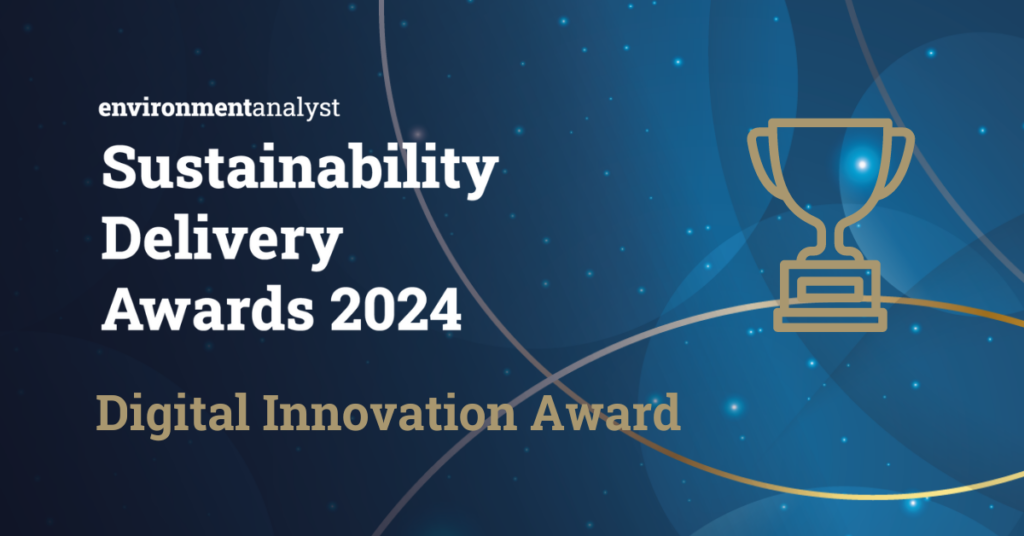Introduction
In an effort to understand the greatest concerns related to the Corporate Sustainability Reporting Directive (CSRD), we conducted an online survey among dozens of relevant companies. The respondents came predominantly from large EU enterprises representing a diverse range of industries and reflecting the fact that large companies are affected by CSRD in the short term. The results provided a fascinating, high-level insight into the current state of corporate sustainability strategies. In this post, we share our key findings with you.
CSRD affects every industry
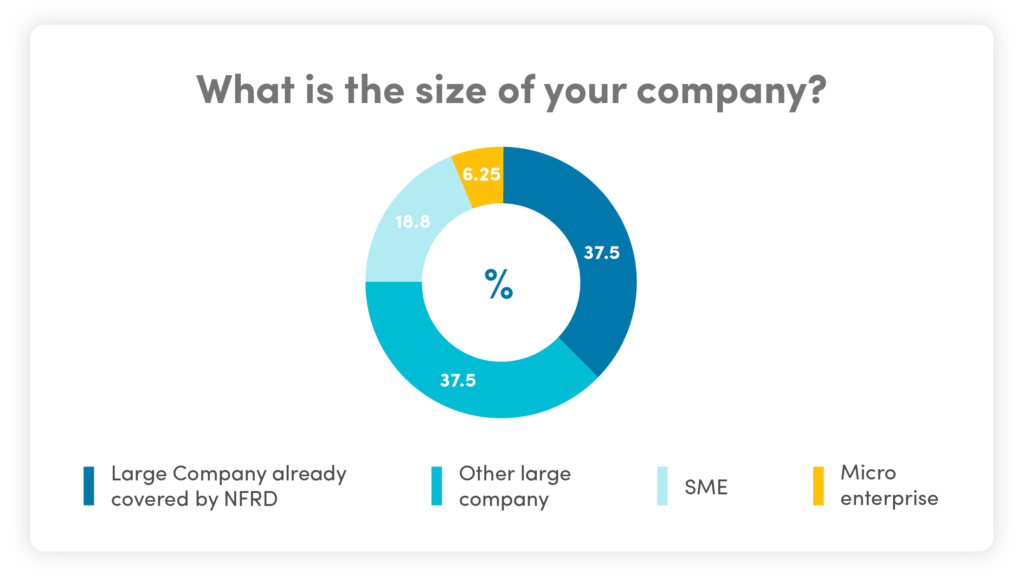
It’s interesting to note that the CSRD directive is a topic of interest across a wide range of company sizes and industries. The diversity of responses gives us a broad perspective on the challenges and concerns related to CSRD across different sectors.
The CSRD is a major ESG (Environmental, Social and Governance) regulation that brings together financial data, ESG information, and assurance for the first time. It aims to improve the availability and reliability of sustainability information while creating a culture of transparency around companies’ impact on people and the environment. This move has the potential to affect several companies.
In fact, the CSRD will apply to approximately 50,000 companies including all large companies and listed companies (except listed micro-enterprises) operating in the EU. Businesses that satisfy two out of the following three requirements are considered large companies and must abide by the CSRD:
- €40 million in net turnover
- €20 million in assets
- 250 or more employees
Sustainability-driven businesses are on a heavy rise
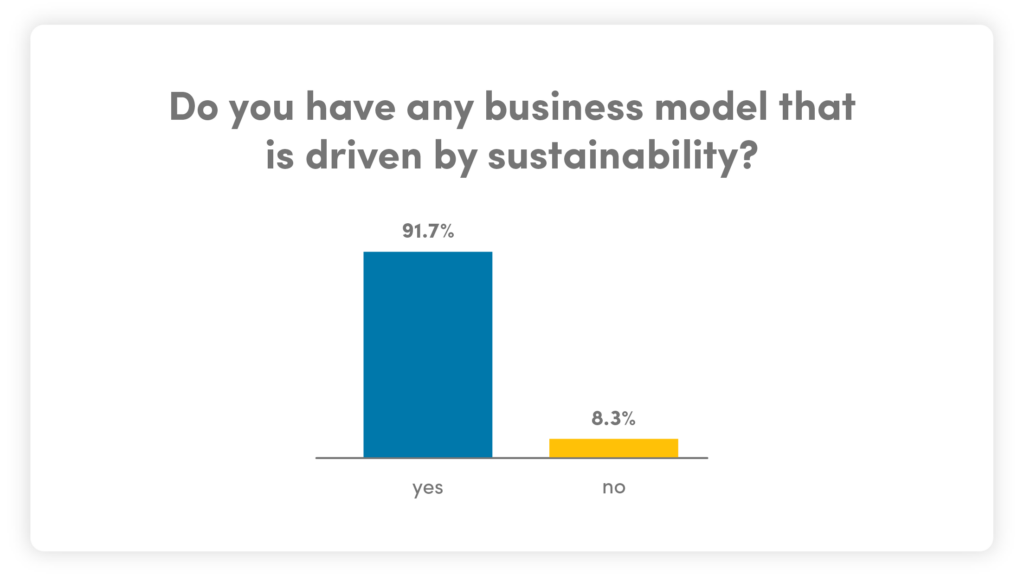
This result is quite encouraging as it shows that a vast majority of companies surveyed are integrating sustainability into their business operations. This not only helps in managing their ESG and sustainability issues but also contributes to their financial (i.e., investors) and business development goals.
This trend is further reinforced by the introduction of the CSRD directive, which mandates comprehensive sustainability disclosures. Ultimately, this shift towards sustainability is not just about compliance, but about contributing positively to our world.
Managing data and timeline is the biggest CSRD concern
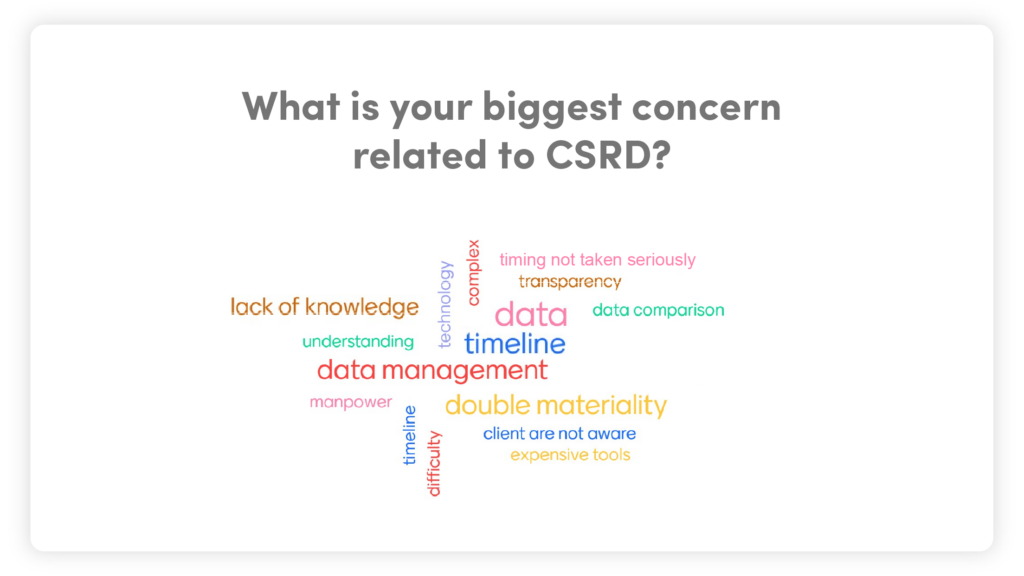
Data management was a major concern among respondents. This reflects the complexities of collecting, managing, and reporting sustainability data. Companies are suffering from issues such as data availability, data comparison, and the use of technology in data management.
These challenges highlight the need for effective data management solutions. The adoption of CSRD management software can offer substantial cost benefits here. These systems streamline the process of data collection, management, and reporting, reducing the time and resources required. They also enhance data quality and comparability, facilitating more effective decision-making. As such, investing in CSRD management software can be a cost-effective strategy for companies navigating the complexities of sustainability reporting.
Time was another significant concern. The CSRD timeline is tight with the first CSRD reports to be published in January 2024. Implementing CSRD strategies can be time-consuming, particularly for companies that are new to the concept or those that are trying to integrate sustainability into all aspects of their operations. It’s worth getting on track with an external consultant very soon.
The concept of double materiality also emerged as a key concern. Double materiality refers to the idea that a sustainability matter can be material from an impact point of view, as it describes the company’s impact on people and the environment, and/or from a financial risk and opportunity perspective. This can be a complex task requiring a deep understanding of a company’s operations and its broader societal context.
The cost of implementing CSRD strategies was also highlighted, with expensive tools being a common response. This suggests that companies are looking for cost-effective ways to implement their CSRD strategies.
Other concerns included lack of knowledge, manpower, complexity, and CSRD not being taken seriously. These responses underscore the need for greater education and awareness about CSRD, as well as the need for adequate HR to implement effective CSRD strategies.
Climate protection dominates sustainability strategies
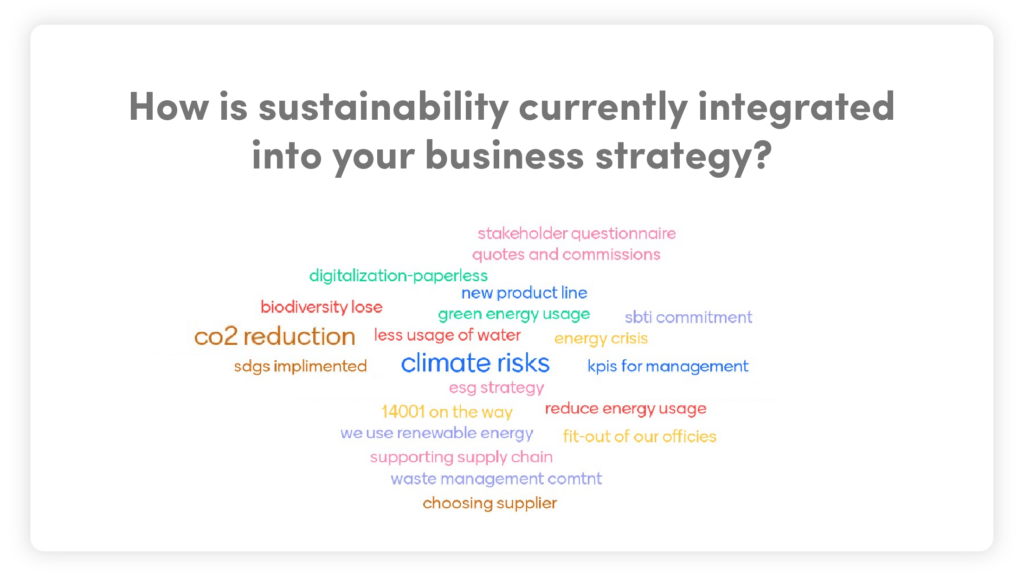
Though we received many responses here, the majority of those circulated around the management of climate risks, indicating a strong awareness of this pressing global issue.
Efficient energy usage and the transition to renewable energy sources were other key themes. Stakeholder communication, product use, supporting supply chains, and choosing sustainable suppliers were also highlighted.
The emphasis on efficient energy usage and transition to “green” technologies is a promising step towards mitigating climate change. It’s encouraging to see companies not only focusing on their own emissions but also considering the broader impact of their supply chain and product use. The holistic approach to sustainability, extending beyond immediate operations, is a testament to the growing understanding of our interconnected world. As we move forward, it will be crucial for these strategies to be effectively communicated and implemented to ensure a sustainable future for all.
ISO 14001 leads the pack among standards used
The chart shows a diverse range of standards used among companies for managing their ESG and sustainability issues. It appears that ISO 14001 is by far the most commonly used among respondents, followed by GRI (Global Reporting Initiative) and ISO 26000 and 50001.
The use of standards for managing sustainability is a positive sign of companies’ commitment to this area. The prevalence of ISO 14001, which sets out criteria for an environmental management system, indicates a strong focus of companies on measuring and improving their environmental impact. The use of GRI and other relevant ISO standards further underscores this commitment. These standards provide comprehensive frameworks that guide companies in their sustainability efforts and aid in compliance with regulations such as the CSRD. As we move forward, the continued adoption and effective implementation of these standards will be key to achieving our global sustainability goals.
Conclusion
The results of our survey underline the importance of addressing concerns to effectively implement strategies related to the Corporate Sustainability Reporting Directive (CSRD).
- Companies need to invest in education to increase understanding of CSRD and its benefits. They should also educate their board members about the new requirements and responsibilities implied by this directive.
- Secondly, embracing a culture of transparency around the company’s impact on people and the environment is crucial.
- Thirdly, integrating financial data with ESG information can enhance the reliability of sustainability information.
- Companies need to allocate adequate human and technological resources for data management and consider cost-effective ways to implement their CSRD strategies.
- Lastly, seeking external assurance can further validate the reported data.
By taking these steps, companies can not only comply with CSRD but also improve their overall sustainability performance.
Companies need to recognize that the Corporate Sustainability Reporting Directive is not just about mitigating risks but also about seizing opportunities. By aligning their sustainability strategies with the UN’s global development goals, companies can contribute to societal objectives while also enhancing their own performance.
In conclusion, while there are certainly challenges associated with implementing CSRD strategies, our survey results suggest that many companies are making significant progress in this area. With continued effort and investment, we believe that these challenges can be overcome. The future of corporate sustainability looks promising if businesses continue to innovate and adapt in response to the evolving landscape of sustainability reporting.
Learn more about the CSRD in our Ebook.
Author: Anna Réti – Marketing Specialist


